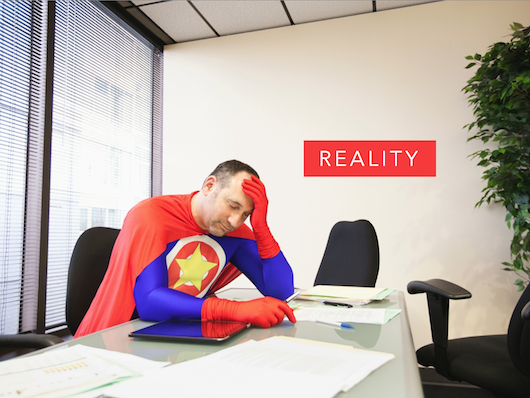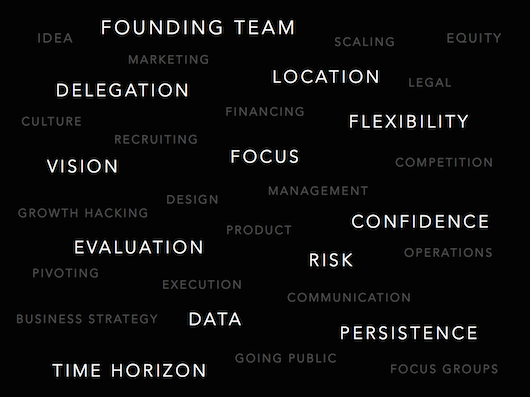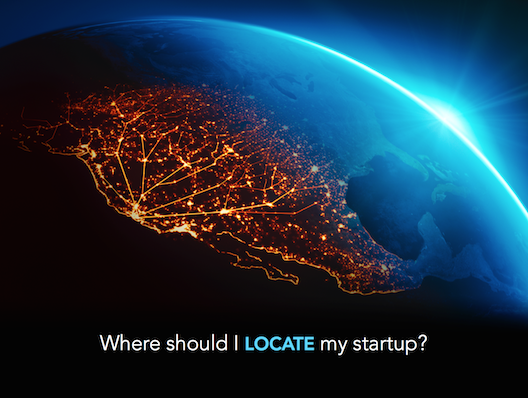Reed Hoffman: About Leadership and Leaders
- Transfer

Stanford course CS183B: How to start a startup . Started in 2012 under the leadership of Peter Thiel. In the fall of 2014, a new series of lectures by leading entrepreneurs and experts of Y Combinator took place:
Second part of the course
First part of the course
- Sam Altman and Dustin Moskowitz: How and why to create a startup?
- Sam Altman: How to build a startup team and culture?
- Paul Graham: An Illogical Startup ;
- Adora Chung: Product and honesty curve ;
- Adora Chyung: Rapid startup growth ;
- Peter Thiel: Competition is the lot of the losers ;
- Peter Thiel: How to build a monopoly?
- Alex Schulz: Introduction to growth hacking [ 1 , 2 , 3 ];
- Kevin Hale: Subtleties in working with user experience [ 1 , 2 ];
- Stanley Tang and Walker Williams: Start Small ;
- Justin Kahn: How to work with specialized media?
- Andressen, Conway and Conrad: What the investor needs ;
- Andressen, Conway and Conrad: Seed Investment ;
- Andressen, Conway and Conrad: How to work with an investor ;
- Brian Chesky and Alfred Lin: What is the secret of company culture?
- Ben Silberman and the Collison Brothers: Nontrivial Aspects of Teamwork [ 1 , 2 ];
- Aaron Levy: B2B Product Development ;
- Reed Hoffman: About Leadership and Leaders ;
- Reed Hoffman: On Leaders and Their Qualities ;
- Keith Rabois: Project Management ;
- Keith Rabois: Startup Development ;
- Ben Horowitz: Dismissals, promotions and transfers ;
- Ben Horowitz: Career Tips, Westing and Options ;
- Emmett Shire: How to conduct interviews with users;
- Emmett Shire: How Twitch talks to users ;
- Hossein Rahman: How hardware products are designed at Jawbone;
- Hossein Rahman: The Design Process at Jawbone.
Reed Hoffman: I looked at the schedule of the lecture course and wondered how you see yourself in the role of founders, and what skills can be useful to you? What do you think is included in this set? In what situations is it worth asking yourself the question: “Am I ready?”, And if not ready, then: “How can I prepare?”.
Let's start by trying to understand who such an outstanding founder is.
Classic examples are Steve Jobs, Bill Gates, Elon Musk, Mark Zuckerberg, Jeff Bezos - these are images of supermen founders who have a panopticon of skills. I can use the word "panopticon" because I'm at Stanford right now. Among the abilities that a manager should have, one can single out the ability to create a quality product that is in demand on the market, as well as strategic and managerial skills.
The ability to seek cash is also important. If we consider the leader of a startup as a superman, then he must perfectly cope with all these tasks, comprehensive, diverse, requiring full dedication.

I focus on these things because I remember at the beginning of my own entrepreneurial journey I read an article that said Bill Gates was smarter than Einstein. And I immediately had the thought:
“Bill Gates is really a smart and educated person, but I'm not sure that even Bill himself would like to be related to the phrase“ smarter than Einstein. ”
Such thoughts arise due to the fact that the entrepreneur appears in the image of a superman, because an outstanding company leader can do anything, for example, jump a skyscraper in one leap. In fact, the founder is the person who copes with all kinds of problems, and not the one who has supernatural powers.

Generally speaking, you would get a couple of superpowers. Any unique skills suitable to solve a problem in order to gain an advantage over competitors. Competitive differences and competitiveness are very important, but not related to genius.
It is often very difficult to tell where the boundary between genius and insanity lies, since, usually, the final result serves as an indicator. Sometimes, when dealing with an uncertain environment, you can be a genius, but a little later you will be considered a person who has completely survived from the mind. Or you may be crazy, but you're lucky and you will be considered a genius. How to relate to this when we, mere mortals, enter into such a battle?

I think that all these skills [slide] are super-important for the outstanding founder. It is very important to possess them and be able to correctly apply them in practice, but the set of such skills is quite large, and mastering them looks like an inhuman task.
I decided to take as a basis an expanded set of these skills and dwell in more detail on some of them that are interesting and worth our attention. What skills really define an outstanding founder? To become an Olympian among entrepreneurs, you need not only to be able to do everything on the list, but to do it better than anyone.

Let's start with the team.
The fact that it is usually better to have two or three people in a team than to remain alone is capable of dispelling the myth of the super-founder. This does not mean that single founders are not able to achieve success - they are capable, and quite loud, just much more often two or three people can work much better.
I say this as an investor - teams are much more likely to succeed [in comparison with singles]. The reasons that contribute to this, we just discussed - this is a very wide range of skills necessary to solve a whole range of problems associated with the development and success of the company. If there are two or three co-founders, then their strengths and weaknesses will balance each other, and you can come to grips with various dangers.
I highly recommend you create a team in which a high level of trust reigns, otherwise you can go the whole year together in one direction, and then some unpleasant thing will happen, and you will scatter in different directions, which will lead to the collapse of entrepreneurial activity. Such situations are not always, but very often prove fatal.

The next item in our discussion is your location.
They often tell me that Silicon Valley has absorbed all the super-talented people, saying that the reason for the success of all Valley startups lies in the immigration of talents, which are very important for the founders of companies that come there. Now, if you look at the situation from the point of view of simple mathematics, you will see that not all software development companies move to the Valley, although the number of software development specialists has been extremely high there over the past 20 years. Not all startups can move there, and many of them operate in different parts of the globe.
Why did I raise a question about the location of the company? Because you have to think about it, regardless of whether you are an outstanding founder or not. To become a successful company, you need to move the startup closer to numerous communities suitable for solving certain problems. The leader must understand that he is not akin to Superman and will not be able to carry out his project anywhere, certainly not in Antarctica. By the way, Silicon Valley is incredibly good for solving some types of problems, but not all. Let me give you a couple of examples.
The first example is Groupon. I do not think it was generally possible to establish it here. Although Groupon is a software product, it has become the foundation of the community. Obviously, Silicon Valley has a lot of great communities using internet technology and all that. Many skilled professionals are located here in Silicon Valley, and communities are great for their tasks. At the start of Groupon, it was important to hire a ton of sales agents, and sales staff both strengthen and weaken the team.
Silicon Valley is a rather unfavorable place for ideas that require renting a twenty-five-story building, twenty floors of which are reserved for “sales”. Here, such a plan is usually of little interest and receives a lot of criticism - not many people want to participate in a project of this kind, where financiers discuss the growth of capitalization and network effects - it is not at all surprising that Groupon had to settle in Chicago. This, in turn, shows the best that startups related to software can function in other places, and not just in the Valley . If you think about it, it’s easy to determine which startups are best not to transfer here.
Imagine someone is creating a startup related to a fashion that is not like Poshmark, that is, it is not a mobile marketplace. A lot of companies like Poshmark feel good in Silicon Valley, but for a new fashion company, this is not the best place to start. Perhaps the idea of such a company is great in itself, but you need communities to support it. Part of the test for an outstanding leader is the ability to answer the question: “Where should I place my startup?”, Which gets up every time you create a company. The answer to it: “Where it will become successful.”
I often compare business with jumping off a cliff when you have to build an airplane on the fly. The idea of the analogy is that it is difficult, and you are a priori dead, but grab at every chance and try to get out of the situation as a winner. Great entrepreneurs are moving businesses closer to a supportive community, and Silicon Valley offers a great community for tech startups, mobile projects, marketplaces, but for other ideas, you need to find another place.

Now let's talk about what has become fashionable now. Nowadays it’s absolutely normal to call yourself “white crows”.
Let's talk a little bit about how to "act differently than others."
And this is nothing complicated, it is much more difficult to be right at such moments. Thinking about how unusual your idea is, and whether it looks like that at all, ask yourself: “How can a smart person disagree with me at all?” If you cannot imagine a person (not illiterate, not crazy, but an expert in any field) able to say what problems your idea will face, then it is no different from others. Unusual ideas depend on the opinion of the audience.
Take, for example, the consumer sector on the Internet: from the point of view of the audience, everyone in this area has already come up with others, and there are not any good ideas left. Evaluating your idea, you need to estimate: “Yeah, what do I know, what others don’t know?”, And it’s not that you are so amazing, so your idea is great - this is a very bad way of evaluating ideas that gives a positive result with the probability of lightning striking you in the field.
For example, in the early days of LinkedIn, I did what I advise other company executives: to communicate with any smart person who wants to talk and give comments, so I personally went around and described the idea of LinkedIn, asking others what they think.
More than two-thirds of my network of contacts, including some very smart people, said I was crazy.
I told you that LinkedIn is a network product, that is, it only makes sense if it is used by a lot of people. The first person does not represent value until someone else joins the service. When the second one joins, the service also makes no sense, because users are already familiar with each other.
When I began to paint the use case, it turned out that the audience of service users will be from half a million to a million people, and their number will never grow again. But I knew something that the critics had no idea. I could come up with several ways to attract people to the project, so that they say: “Hey, I believe in this idea, I think it’s interesting, similar products must exist, and I would like to try it” and direct this enthusiasm to the growth of the community, so that you can start implementing valuable projects offered by LinkedIn.
When you think about moving in a non-standard direction, you need to think about why other smart people disagree with you, and is there any common sense in this? What will allow to bring the idea to life? I must say, it is useful for the head of the company to think outside the box.
In addition to the topic of non-standard thinking, I will say that it can manifest itself in different ways. For example, the most common situation is when people think that you have a small idea, but in fact it is huge. Here is another LinkedIn example: while non-business online startups want to achieve rapid success, the income curve of gradually developing projects can be very, very promising. LinkedIn was built gradually, year after year, and such a model is atypical today.

As your project develops, you begin to encounter a bunch of problems that are mainly faced by all the founders of companies.
Should I do the work myself or hire people, distributing authority?
The classic answer to this question is: you must do both. In fact, it turns out that you do not just need to do both, but sometimes do one thing 100%, sometimes do another 100%, and even do both at the same time, although this does not fit very well with mathematics.
When you think about what makes you an outstanding leader, you come across obvious paradoxes, and that's fine.
I often give another paradoxical advice, which sounds like this: you must be persistent, but be able to make concessions. Entrepreneurs are often advised to have their own vision and to stand firmly on their feet in an unfavorable environment. Knowing that your vision is contrary to what others believe, you need to continue to follow your own path, overcome all adversities and achieve your goal.
On the other hand, according to this advice, you must equally be able to analyze data and listen to customers. Do not be afraid to change the business model, be flexible. An outstanding entrepreneur always understands when to persevere and when to give in. I always say that when implementing a project, investing in a project, creating a company, you need to formulate an “investment declaration” for yourself, which would answer the question why your idea, with which many disagree, will turn out to be good in the future: you need to fix it what you know, while others do not know.
Then, entering the battlefield, you begin to ask yourself questions: “Am I still confident in my investment declaration? Why did we decide that was a good idea? ” If my confidence only grows stronger, then I hope to stay in the game and continue to follow my route.

Be more persistent when overcoming trials, this only strengthens your faith in the idea.
If your faith fades, then this is not the end. A huge number of startups, for example PayPal, LinkedIn, Airbnb, of which I was a part, experienced periods when the thought visited us: “Oh my God, why did we decide that was a good idea?” At such moments, all the horrors hiding in the darkness seem real.
For example, in August 2000, PayPal earned 12 million, and the cost curve grew exponentially: we had no income, and faith in the idea died away. However, we asked ourselves what can we do? How do we fix things? This made it possible to develop a plan and immediately take action.

Another question: should I believe or be afraid?
Should I follow my vision of the world and ignore everything else? Being an outstanding entrepreneur means believing in your idea, thinking about what you want to do and where you want to do it, but being smart enough to accept negative reviews, follow the work of your competitors and listen to criticism.
Does your direction or plans change? If this happens, this does not mean that your faith in the idea is weakening, it means that you need to be patient. How to combine all this?
Should I focus only on my product? Should I deal with the project, ignoring everyone, including competitors? Or should I focus on foreign policy and hire people? Date people Should I collect community information? And again the answer: you must do everything at once, because the ability to adapt to any situation determines the outstanding founder.

Sometimes you have to direct 90% of the efforts in one direction, and sometimes 80% in the other. To get started, you need to understand what your immediate problem looks like.
To do this, I wonder what we should do and how it is worth sharing the work? Often people simply rely on customer data from user groups. Many entrepreneurs do not quite correctly believe that it is necessary to constantly collect data and rely on them in everything. In fact, the data exists only within the limits of your vision, that is, the direction in which you are moving, but the estimates of indicators that are important to you can be negative, which can make you change your mind about any issue. If you have your only and unique vision, then it is not at all necessary that it will not change during the movement to the end point.

For example, everyone knows that PayPal has become the new world currency. I know that Peter was here, and one of the jokes I told him was: “We have a new world currency that we exchange for dollars, you may have heard about them, they existed for some time.” In fact, we have become currency traders, and now something similar is happening with Bitcoin, but this is a separate topic for discussion. Be that as it may, our idea was to organize a worldwide community that would allow us to make deals, trade, and bring e-commerce to every existing business.
Our vision remained unchanged, but first we wanted to create a banking model, then we thought about a credit model, but ended up with a mass trading model. How did it happen? You always enclose data in a framework of vision, but what you learn as you move forward changes it.
